If you are interested in the best vitamin supplements you have come to the right place because in this writing we offer you very useful information on these new foods and about the 13 vitamins that humans need in nutrition.
We have divided the article into four parts. In the first part we present a list of the best vitamin supplements with their corresponding description.
In the second part we comment on vitamins, anti-vitamins and provitamins which are closely related substances in nutrition.
The third and fourth parts are dedicated to the exposure of the functions of vitamins, the causes of their deficit and the signs, symptoms and illnesses due to their deficit. In the third part we also include the causes and signs, symptoms and diseases due to the excess of each of the fat-soluble vitamins.
The functions of vitamins are the foundation of why we should take vitamin supplements, while the signs, symptoms and illnesses due to vitamin deficit or excess indicate when we should take these supplements and when not.
If you are only interested in supplements just consult the first part of the article, although we recommend reading the remaining parts because they contain valuable information.
| Which part do you want to read first? Click on its title |
| The best vitamin supplements |
| Vitamins, anti-vitamins and provitamins |
| Fat-soluble vitamins |
| Water-soluble vitamins |
| Final notes |
The best vitamin supplements [↑]
A vitamin supplement is a food supplement that contains one or more of the vitamins our body needs.
Vitamin supplements with several vitamins are called multivitamins or polyvitamins.
It is common for multivitamin supplements to also contain minerals. When this happens, the words vitamins and minerals appear on the label.
Single-vitamin supplements are less common than multivitamin supplements and are consumed when we need only that vitamin.
Too much vitamin A, D, E, or K can cause health problems. For this reason, taking supplements containing one or more of these vitamins requires the advice of a physician or nutritionist.
If you would like further information on any of the vitamins A, D, E or K with regard to their role in human health and the effects of their deficits or excesses, please consult the section dedicated to fat-soluble vitamins.
For more information on the role of B-complex vitamins and vitamin C in our health and the effects of their deficiencies, see the section on water-soluble vitamins.
Below is a list of the best vitamin supplements according to manufacturer prestige, product quality and customer feedback.
The list covers the 13 essential vitamins that humans need for good health.
Best vitamin A supplement [↑]
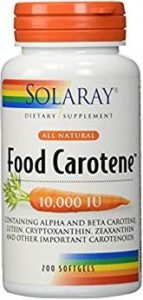
Food Carotene is a natural product manufactured by Solaray and it is composed of carotenoids which are provitamins A, i.e. non-toxic substances that are transformed into active vitamin A in our body through metabolism.
Carotenoids also have antioxidant properties that help prevent oxidative damage associated with aging. For this reason, they are among the best anti aging supplements.
The people who have used Food Carotene have been very satisfied; most of them have given it a five-star rating.
This product is among the best sellers of its category in Amazon USA.
Best vitamin D supplement [↑]
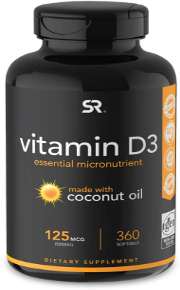
Vitamin D3 is an excellent vitamin D supplement whose main function is related to the regulation of calcium and phosphorus in our body.
This vitamin is soluble in oil; in Vitamin D3 capsules it is diluted in olive oil.
This supplement does not contain gluten or GMO (genetically modified organisms); it is manufactured in the USA by NatureWise which is NSF certified for the quality of its products.
The bottle of Vitamin D3 covers your vitamin D needs for one year.
This product is widely accepted by people taking vitamin D supplements. It is one of the best selling products in its category on Amazon USA.
Best vitamin E supplement [↑]
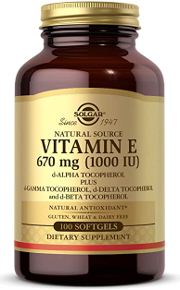
Vitamin E is a vitamin E supplement manufactured in the USA by Solgar and one of the best-selling products in its category in Amazon USA. It does not contain gluten or genetically modified organisms.
The people who have used Vitamin E manufactured by Solgar have been very satisfied; most of them have rated this product with five stars.
The bottle of this product covers your vitamin E needs for three months.
If you need a vitamin E supplement, you have a good choice in this product.
Best vitamin K supplement [↑]
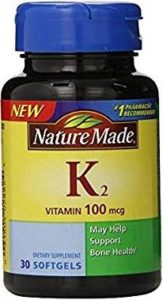
Nature Made Vitamin K2 is a vitamin K supplement manufactured by Nature Made.
The people who have used this product are very satisfied and consider it to be of excellent quality; most of them have given it a five-star rating.
Each bottle of Nature Made Vitamin K2 covers your one-month vitamin K needs, but at Amazon USA it is available in combo packs of two or three bottles.
Consult your doctor or a nutritionist before taking this supplement.
Vitamin B Complex [↑]
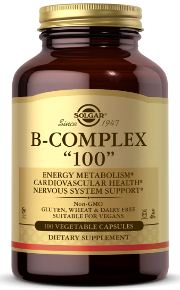
B-Complex “100” is a vitamin supplement manufactured in the USA by Solgar. It contains all the vitamins of the B complex, which are essential for life.
The deficit of these vitamins can cause several illnesses, some of them serious. In the section of water-soluble vitamins of this writing you can get information on this subject.
B-Complex “100” is one of the best selling supplements in its category on Amazon USA. There are hundreds of opinions about its quality expressed by people who have used it; most of them have rated it as a five-star product.
If you are under the age of 18, pregnant or breastfeeding, you should not take this supplement without consulting your doctor.
The advantages of this supplement compared to other similar ones are its excellent quality, its low price and it covers the needs of all the vitamins of the B complex.
Best vitamin C supplement [↑]
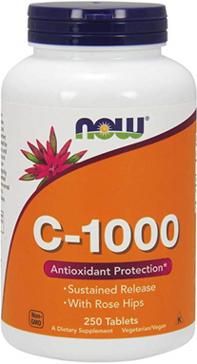
C-1000 is a vitamin C supplement manufactured in the USA by the prestigious company NOW Foods.
Vitamin C has several functions in the body that make it essential for life. It must be consumed daily in the diet or through the intake of a supplement due to its solubility in water.
C-100 is one of the best-selling supplements of its category in Amazon USA. Most of the people who have used it have expressed very favorable opinions about its excellent quality and have awarded it the five star rating.
If you need a vitamin C supplement, C-1000 is an excellent choice. It is a super antioxidant supplement.
Vitamins, anti-vitamins and provitamins [↑]
In this section we will describe three closely related substances involved in human nutrition: vitamins, anti-vitamins and provitamins.
The most popularly known are vitamins, but all three are important.
The word vitamin comes from its original name: vitamine. It was introduced by Polish physician Casimir Funk (1884-1967) in 1911 to indicate vitamins were essential amines for life. Amines are nitrogenous organic compounds derived from ammonia.
Subsequently, the final e was removed from the English word because it was discovered not all vitamins are amines.
Essential vitamins in human nutrition
We are familiar with the concept of vitamin because we know vitamin A, vitamin C and B-complex vitamins, among others.
However, it is difficult to answer by definition questions such as what is a vitamin? or what are vitamins?
Definition of vitamin
Vitamins have the following identifying characteristics:
- They are organic compounds, i.e. substances whose molecules contain one or more carbon atoms forming carbon-carbon or carbon-hydrogen bonds.
- Our body needs them for its good functioning.
- They are of animal or vegetable origin.
- All this substances are micronutrients and they are present in small amounts in food.
- The amounts we need should be obtained from diet and dietary supplements.
- Their deficit in the human organism can cause diseases; some of them serious.
- Diseases due to deficiencies can be cured quickly when the required amounts are delivered on time.
These characteristics can be used to define the concept of vitamin as an organic compound of animal or vegetable origin that we obtain from foods in the diet or from food supplements and whose deficit can cause diseases that are cured quickly, if the necessary doses are supplied in time.
Avitaminosis does not only occur in the human aging process; it can also occur in young people, even in newborns.
Types of vitamins
Vitamins, according to their solubility, are divided into two types: fat-soluble vitamins and water-soluble vitamins.
This division is convenient from a physiological point of view, but not from a functional point of view.
Initially it was believed that there were only two vitamins, one fat-soluble and the other water-soluble. The fat-soluble vitamin was called vitamin A and the water-soluble, vitamin B.
The fat-soluble vitamins are: A, D, E and K. The water-soluble vitamins are vitamin C and the eight that make up the B complex: B1, B2, B3, B5, B6, B8, B9 and B12.
Anti-vitamins
An anti-vitamin is a natural or synthetic substance with a vitamin-like structure that can interfere with the normal functioning of the vitamin by inhibiting its action, deactivating it, or chemically destroying it.
Anti-vitamins of a vitamin are also called its antagonists.
Examples of anti-vitamins are the following substances:
Dicumarol
Dicumarol is an anticoagulant derived from coumarin that works as an anti-vitamin K by inhibiting the action of vitamin K. It was the first oral anticoagulant isolated and the first to be used in medical treatments. It is rarely used today due to its slow absorption and adverse effects.
Thiaminase
Thiaminase is an enzyme found in raw freshwater fish, raw crustaceans, and beverages such as tea and coffee. This enzyme destroys vitamin B1 and for this reason, a diet based on raw fish can cause conditions due to vitamin B1 deficiency.
Aminopterin
Aminopterin is an antagonist of vitamin B9 synthesized by the team of Indian doctor Yellapragada Subbarao (1895-1948), father of clinical chemotherapy. It was designed for the treatment of childhood acute lymphoid leukemia.
Avidin
Avidin is a substance contained in egg white with anti-biotin action because it binds to it forming a compound not absorbable by the human gastrointestinal tract. The adivin is destroyed during egg cooking. Consequently, we should not eat raw eggs.
Ascorbic acid oxidase
Ascorbic acid oxidase is a compound contained in cucumber and zucchini that inhibits the functioning of vitamin C. The substance is destroyed if these foods are cooked, but cooking also destroys the vitamin C they contain.
Provitamins
You may have heard we can get vitamin A, if we eat carrots, and if we are exposed to the sun, we can get vitamin D.
In the first case we are in a situation where a substance contained in carrots is transformed by the metabolism into vitamin A and in the second, a substance located under the skin is transformed into vitamin D in a metabolic process that requires the action of the sun’s rays.
The fundamental advantage of consuming provitamins over vitamins is that the organism only transforms provitamins into vitamins in the necessary amount, avoiding hypervitaminosis.
Fat-soluble vitamins [↑]
The fat-soluble vitamins (A, E, D and K) have the following common characteristics.
- They are soluble in fat and fat solvents.
- There are precursors or provitamins that are transformed into them in metabolism.
- They are not absolutely necessary in the daily diet.
- The excesses due to their intake above the daily needs are not excreted.
- Excess causes health problems and illnesses, some of them serious.
- The symptoms of illnesses due to its deficit appear slowly.
Knowledge of these characteristics is important because they must be taken into account in the ordinary diet and in the intake of food supplements.
Vitamin A
It has been vitamin A plays an important role in physiological functions related to normal growth and development, vision, maintenance of normal epithelial structure, immune system integrity and reproduction.
Vitamin A deficit
The most common causes of vitamin A deficiency are insufficient dietary intake or chronic malabsorption of fats.
It is also known that prolonged deficiency can cause eye or skin diseases, including keratitis, keratomalacia, xerophthalmia or keratosis.
Adequate nutrition or vitamin A supplements can make up for the shortfall.
Vitamin A excess
The main cause of excess vitamin A is the uncontrolled intake of vitamin A-rich foods of animal origin or supplements with preformed vitamin A. Carotenoids are not included in this category.
When the excess is prolonged and in numbers superior to 3,5 umol/L it can cause hair loss, bone fractures, dryness of the mucous membranes, fatigue, fever, insomnia, loss of body weight, diarrhea, anemia and hepatic damage.
If you’ve been looking for good quality vitamin A, the list of vitamin supplements placed at the beginning includes a vitamin A supplement.
If you wish, you can review the list of the best vitamin A supplements that our team has formed from the analysis of five important indicators.
Vitamin D
Hormones regulate physiological functions. Vitamin D acts as a hormone along with parathyroid hormones and calcitonin in regulating the metabolism of calcium and phosphorus that ensures the levels of these minerals in the bones and blood.
Vitamin D deficit
The causes of vitamin D deficiency are the intake of a diet low in vitamin D, limited exposure to sunlight, renal or hepatic insufficiency that reduce its transformation into the active form or absorption deficiencies in the digestive system.
Vitamin D deficiency in children often causes rickets, a disease whose first symptoms are restlessness, profuse sweating, lack of tone in the extremities and abdominal muscles, softening of the skull bones, cramps and contractures of the muscles.
Advanced rickets produces skeletal deformities that are manifested in arched legs and curves in the bones of the thorax and pelvis.
In adults, vitamin D deficiency can cause osteoporosis and osteomalacia.
Osteoporosis is a bone disease characterized by increased bone density. As a result, the bone marrow is compressed and the production of new blood cells decreases, causing anemia, bone fragility and susceptibility to infection.
Osteomalacia is also called adult rickets. It is characterized by inadequate mineralization of the bones causing skeletal deformities, rheumatic pains in the bones of the lower back and legs and spontaneous multiple bone fractures.
Vitamin D excess
The primary cause of excess vitamin D is supplementation. Excess due to diet is unlikely, only consumption of cod liver oil could cause it.
The list of vitamin supplements in the first section includes a vitamin D supplement.
Vitamin E
Vitamin E is an antioxidant agent. It protects cholesterol from oxidation and cell membranes from the action of toxic compounds, heavy metals and free radicals.
Vitamin E deficit
Health statistics show the vitamin E deficiency is rare. It is common in premature or low birth weight infants, people with steatorrhea (excessive elimination of fats from the stool), or diseases that cause malabsorption of fats such as biliary atresia, chronic pancreatitis, and cystic fibrosis.
Vitamin E deficiency causes neurological disorders, injuries to the kidneys and the reproductive system.
Intake of higher doses than required may cause hypervitaminosis E.
Vitamin E excess
Long-term excess vitamin E can interfere with intestinal absorption of vitamins D and K.
A daily intake of vitamin E greater than 1000 mg has been shown to cause headache, fatigue, weakness, blurred vision, antagonize the clotting action of vitamin K, and increase the effects of warfarin therapy.
Medical experience shows that a daily dose greater than 100 times the recommended dietary allowance (RDA) can cause bleeding after surgery.
If you would like to purchase excellent quality vitamin E, please see the list at the beginning of this article.
Vitamin K
Vitamin K is involved in the formation of prothrombin and other blood clotting factors. It also participates in the biosynthesis of proteins that influence bone formation and the enzyme system of respiration.
Vitamin K deficit
Vitamin K deficiency in adults is rarely caused by dietary deficiencies because many plants are sources of this vitamin and because intestinal bacteria synthesize it.
The fundamental causes of vitamin K deficiency in adults are malabsorption of fats, biliary obstruction, liver dysfunction, prolonged treatment with broad-spectrum antibiotics that eliminate the bacteria that synthesize the vitamin and accidental or therapeutic intake of antagonists.
Breastfeeding children are often deficient in vitamin K because the prenatal reserve in their body is low, their intestinal flora is not sufficiently developed to synthesize it and breast milk is poor in this vitamin.
The prolongation of the coagulation time often causes internal bleeding and the accumulation of calcium salts in the walls of the arterial vessels, causes arteriosclerosis.
Vitamin K excess
Although vitamin K is fat-soluble, there are no known cases of toxicity by excess due to intakes from natural sources.
Cases of excess vitamin K toxicity are due to intakes from synthetic sources.
Toxic effects include hemolytic anemia, hyperbilinrrubinemia, or kernicterus (severe form of jaundice in infants) with underdeveloped liver function.
The list of the best vitamin supplements we have placed in Section 1 of this article includes a vitamin K supplement.
Water-soluble vitamins [↑]
The water-soluble vitamins (C, B1, B2, B3, B5, B6, B8, B9 and B12) have the following common characteristics:
- They are soluble in water.
- All this vitamin must be ingested daily with the exception of vitamin B9 and vitamin B12.
- They do not usually have precursors, i.e. they are not usually obtained from other substances through metabolic processes.
- Excesses above daily requirements are excreted in urine with minimal storage in the body.
- The signs and symptoms of disorders and diseases caused by its deficit appear quickly.
Vitamin B1
The active form of vitamin B1 or thiamine is a compound called adenosine pyrophosphate, which acts as a coenzyme in the metabolism of carbohydrates and other substances, some of which are involved in the functioning of the nervous system.
These functions of vitamin B1 make it essential for normal development and growth by helping to maintain the functioning of the heart, digestive system, and nervous system.
The reserve of vitamin B1 in the body is reduced due to its solubility in water. It is stored in bone tissues.
The main causes of vitamin B1 deficiency are insufficient daily dietary intake, alcoholism and the intake of foods high in thiaminase.
When the deficit is prolonged it can cause beriberi and Wernicke-Korsakoff Syndrome[1].
The word beriberi is of Sinhalese origin; it means extreme weakness and designates a disease whose general symptoms are fatigue, digestive problems and numbness and weakness of the extremities.
Wernicke-Korsakoff Syndrome is a neurological disease whose first symptoms are mental confusion, amnesia, and impairment of recent memory.
If you have been diagnosed with vitamin B1 deficiency, see the list of the best vitamin supplements in section 1.
Vitamin B2
Vitamin B2 or riboflavin is a yellowish-green compound that in combination with other substances form coenzymes that intervene in the metabolism of carbohydrates, lipids, proteins and other vitamins.
These characteristics make it necessary for the maintenance of the cornea, skin and mucous membranes.
Vitamin B2 also intervenes in the prevention and cure of intoxications of the organism and has antiviral, antibiotic and antiparasitic functions against pathogens that infect blood components: platelets, red blood cells and plasma.
Needs of vitamin B2 intake depend on the amount of energy nutrients you consume.
The causes of vitamin B2 deficiency are the consumption of a diet that does not cover the needs, bad absorption of the vitamin in the intestine, chronic alcoholism, diabetes, hyperthyroidism, excess of physical exercises, prolonged fevers, intense environmental heat and stress.
Riboflavin deficiency causes vision disorders, anemia, slow wound healing, fatigue and oral and skin disorders.
If you want to avoid vitamin B2 deficiency, use the B-complex supplement placed in the list of best vitamin supplements in section 1.
Vitamin B3
Niacin, vitamin B3 or nicotinic acid is the precursor of two coenzymes that intervene in most of the oxidation-reduction reactions that occur in our body and particularly in the metabolism of carbohydrates, lipids and proteins
This vitamin also participates in the synthesis of some hormones, decreases the production of bad cholesterol, while increasing good cholesterol and plays an important role in growth.
Vitamin B3 deficit
The main cause of vitamin B3 deficiency is the intake of a diet poor in this vitamin as it occurs in cultures where its main food is corn.
Vitamin B3 deficiency slows the metabolism and consequently decreases tolerance to low temperatures.
When the deficit is sustained over time it can cause pellagra, a disease characterized by skin lesions and digestive and neurological alterations.
Vitamn B3 excess
The fundamental cause of excess niacin is the intake of supplements.
Unlike other B-complex vitamins, excess vitamin B3 is toxic. It can cause facial redness, dry skin, skin rashes, liver failure, cardiac arrhythmias, hyperglycemia, vomiting or maculopathy.
If you need niacin, use the B-complex supplement from the list in section 1.
Vitamin B5
Pantothenic acid or vitamin B5 is one of the components of coenzyme A that intervenes in the reactions of acetylation and acylation, oxidation of ketoacids and fatty acids, formation of acetylcholine and in the synthesis of triglycerides, phospholipids, steroids and porphyrins.
Acetylcholine is a very important substance in the body because it influences various systems and apparatuses in the body.
Pantothenic acid also contributes to the maintenance of skin health and hair colour.
Vitamin B5 deficiency is rare because many foods in the diet contain it. The prefix panto that forms its name comes from the Greek and means everywhere.
Signs and symptoms of deficit include headache, nausea, allergies, abdominal pain and burning sensation in the feet.
If you are deficient in vitamin B5, see the list of the best vitamin supplements in section 1.
Vitamin B6
Vitamin B6 or pyridoxine is a coenzyme of many enzymes. It is involved in the metabolism of amino acids.
Pyridoxine is transformed into pyridoxal phosphate which is involved in obtaining pantothenic acid from the amino acid tryptophan, production of urea and metabolism of fatty acids.
This vitamin also has functions related to the production of substances involved in the functioning of the brain including myelin and serotonin, a neurotransmitter known as the pleasure and mood hormone.
The causes of vitamin B6 deficiency in adults are rarely due to diet. It occurs in people who are deficient in other vitamins, people who take certain drugs for a long time such as levodopa, hydralazine, isoniazid or oral contraceptives, people with kidney failure, and pregnant women.
Vitamin B6 deficiency in infants is mainly due to the use of dietary formulas with insufficient vitamin content.
Signs and symptoms of vitamin B6 deficiency in adults include neurological disorders, seborrheic dermatitis, vomiting, nausea, depression, and stomatitis.
In cases of prolonged deficit, kidney stones or bladder stones due to oxalate formation may occur.
In infants, vitamin B6 deficiency causes hyperirritability, poor growth and convulsions.
The causes of excess pyridoxine are mainly due to the intake of oral supplements in doses much higher than the recommended dietary allowances (RDA).
If you wish to purchase a supplement with vitamin B6, in section 1 you have a list of the best vitamin supplements.
Vitamin B8
Vitamin B8, biotin or vitamin B7, as it is also called, binds with other substances to form biocytin that acts as a coenzyme in processes related to the transfer of carbon dioxide that are involved in cell duplication.
Biotin deficiency due to diet in adults is rare. It occurs in people receiving long-term total parenteral nutrition[2] or people on hemodialysis.
The main causes of biotin deficiency are frequent consumption of raw eggs, treatment with antibiotics such as streptomycin, prolonged anticonvulsant therapy, alcoholism and deficit of biotinidase, an enzyme that intervenes in its synthesis.
Vomiting, hypotonia, metabolic acidosis and neurological changes occur in infants with biotinidase deficiency.
Excess biotin is unlikely because it is excreted in the urine.
If you need a supplemental biotin intake, use the B-complex supplement listed in section 1.
Vitamin B9
Vitamin B9 is one of several names for folic acid. It functions as a coenzyme in the metabolism of amino acids and nucleic acids.
This vitamin participates in the synthesis of proteins and hemoglobin and plays an important role in the formation and maintenance of new cells, typical of childhood and pregnancy.
Folic acid reduces the incidence of cardiovascular disease and defects in the formation of the neural tube, a longitudinal structure located in the central axis of the developing human embryo from which the brain, spinal cord and other tissues of the central nervous system are formed.
It is also known vitamin B9 may reduce the risk of breast cancer and pancreatic cancer.
Vitamin B9 deficit
The causes of folic acid deficiency are insufficient intake, increased requirement for conditions such as pregnancy, infancy and hypothyroidism; poor absorption, increased losses, exposure to ultraviolet rays and interference from drugs such as anticonvulsants, antimalarials and methotrexate.
Vitamin B9 deficiency often slows growth in childhood.
Vitamin B9 excess
Folic acid intake should be controlled and not exceed 1 mg per day in adults over 18 years of age because excess can cause hypersensitivity, interfere with zinc use, obscure symptoms of pernicious anemia and other conditions due to vitamin B12 deficiency, and antagonize anticonvulsant therapy.
Although folic acid is water-soluble, it is stored in the liver and therefore its daily intake is not necessary.
If you need a supplement with folic acid, use Vitamin B Complex. It is included in the list of the best vitamin supplements in the first section.
Vitamin B12
Vitamin B12 or cobalamin is one of the most necessary to maintain good health. This vitamin functions as a coenzyme in the metabolism of odd long chain fatty acids and in the transfer of methyl.
Methyl transfer is involved in the cell multiplication process and specifically in the functioning of the bone marrow, where blood cells are formed.
This vitamin is mixed in the stomach with a substance called Castle intrinsic factor without the help of which it cannot be absorbed.
Vitamin B12 deficiency due to diet is rare; it usually occurs in people who eat only plant-based foods.
Children breastfed by mothers who use this form of nutrition are also often deficient in vitamin B12.
The root causes of non-dietary vitamin B12 deficiencies are a lack of intrinsic factor and malabsorption caused by conditions such as diverticula in the ileum, intestinal infections, and sprue (a disease of the small intestine characterized by flattening and abnormal atrophy of the hair).
Vitamin B12 deficiency causes ulcers on the tongue, generalized weakness, pernicious anemia, and neurological disorders due to demyelination of the spinal cord, brain, and optic and peripheral nerves.
The intake of high doses of vitamin B12 is not toxic. Reserves are stored in the liver and may last three to four years without additional supply.
In the list in the first section you have access to one of the best vitamin supplements with vitamin B12.
Vitamin C
Vitamin C or ascorbic acid is a potent antioxidant; it prevents the formation of carcinogenic nitrosamines by reducing nitrites.
This vitamin has other important functions in the body. It is involved in the formation and maintenance of the intercellular cementitious substance and in the metabolism of folic acid, histamine and the amino acids tyrosine and phenylalanine.
Another function of vitamin C is related to the absorption of iron by its role in the conversion of ferric oxide to ferrous oxide.
The causes of vitamin C deficiency are insufficient dietary intake, smoking, severe burns and stress.
Vitamin C deficiency can cause scurvy[3], anemia, delayed or incomplete wound healing, or reduce the body’s immune response to infections.
Scurvy is a disease that causes bleeding gums, loose teeth, joint pain and stiffness, and subcutaneous and deep tissue bleeding.
Excess vitamin C is excreted in the urine, although if it is elevated, it can cause kidney stones, diarrhea, or interfere with the anticoagulant effects of heparin.
You have access to an excellent vitamin C supplement in the first section of this article.
Final notes about the best vitamin supplements [↑]
In this article we have given you a list of the best vitamin supplements which covers all vitamin needs.
We have also included a summary of the most relevant information on each of the 13 vitamins we need in nutrition in terms of functions, deficits and excesses.
We reiterate the consumption of fat-soluble vitamins must be supervised by a health professional because excesses can be toxic.
If you’ve found this article helpful, share it with your social network friends.
Referencias:
1. ↑ Korsakoff Syndrome. Wikipedia. https://en.wikipedia.org/wiki/Korsakoff_syndrome
2. ↑ Parenteral nutrition. Wikipedia. https://en.wikipedia.org/wiki/Parenteral_nutrition
3. ↑ Scurvy. Medlineplus. https://medlineplus.gov/ency/article/000355.htm


